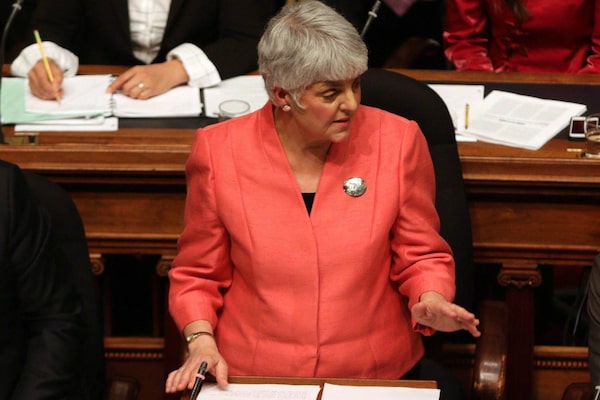
Carole James, now B.C.'s Finance Minister, reacts following the former BC Liberal government’s budget in February, 2016.CHAD HIPOLITO/The Canadian Press
British Columbia finished its most recent fiscal year with a $2.7-billion surplus due to significantly increased revenues – a reality the province's new NDP government says sets the stage for it to begin implementing its agenda when it tables its first budget next month.
The surplus, which is 10 times higher than what the former Liberal government projected last year, does not directly affect the New Democrats' ability to pay for their election promises, since, by law, any surplus must be applied to the provincial debt. But Finance Minister Carole James said the NDP government expects the recent economic performance to continue into the current fiscal year.
Ms. James said in a statement that the government's first budget, expected on Sept. 11, will offer "specific details" on how it will fund increased investments in programs and services. The budget will be an update to the fiscal plan the Liberals tabled, but never passed, earlier this year; the NDP will present a full budget next February.
During a news conference in Victoria on Tuesday, the Finance Minister pledged to deal with an "affordability crisis" in B.C., a promise from the campaign for the May provincial election.
"We're going to focus on allocating the province's finances in a much more equitable way," Ms. James said.
"[It's] not simply a social issue. It's also an economic issue and it's important to recognize we're certainly not going to be able to make all the changes that need to be done overnight. It's going to take time, but that doesn't mean we shouldn't get started."
The 2016-17 public accounts, which offer a final look at the province's fiscal year that ended on March 31, show the government collected more than expected in taxes, including personal income taxes.
As well, B.C.'s GDP grew by an estimated 3.7 per cent in 2016.
Tuesday's figures are largely in line with unaudited numbers the former Liberal government released in June, days before its defeat in the legislature.
The NDP has already announced several measures that will be part of its coming budgets. Last month, the government said it would raise disability rates by $100 a month at a total cost of $104-million for the coming fiscal year. The government will also eliminate tuition fees on adult basic education or English-language training programs.
The NDP election platform's affordability agenda also included $10-a-day daycare enacted over several years, $400 annual rent rebates for tenants and eliminating tolls on a pair of Lower Mainland bridges.
Still, Ms. James said she is concerned about the cost of fighting wildfires, especially after the news that crews are now dealing with the largest-ever forest fire in B.C. history. She said the September budget update will include this issue and the fact that costs are $389-million over the February budget estimate.
The public-accounts documents also indicate that a 15-per-cent tax on foreign home-buyers brought in last August in Metro Vancouver collected $102-million in revenue to the end of 2016, Ms. James said, adding that she could not say whether the NDP would expand it to other hot real estate markets, including Vancouver Island.
Ms. James said she is happy with the economy she has inherited from the BC Liberals, ousted after 16 years in power by the NDP and BC Green Party in a confidence vote. The Lieutenant-Governor asked NDP Leader John Horgan to form a government.
"I am really pleased to see the growth numbers for B.C.'s economy. That's critical. A growing economy is important for all British Columbians," Ms. James said.
BC Liberal finance critic Shirley Bond said the "unanswered question" now is whether the NDP can sustain growth in B.C.'s economy.
"This should not be a one-time spending spree that government can never afford again. We need to see a plan to sustain revenues."
BC Green Party Leader Andrew Weaver said on Tuesday he hopes the government sticks with commitments to invest in education if the province stays in a strong economic position.
In a statement, Mr. Weaver also cited other priorities in the governance agreement that the BC Greens and the NDP signed, committing the two parties to work together. They include a pilot project for a basic income to address long-term income security and a pharmaceutical drugs program to deal with the high costs of medications.
With a report from The Canadian Press
 Ian Bailey
Ian Bailey